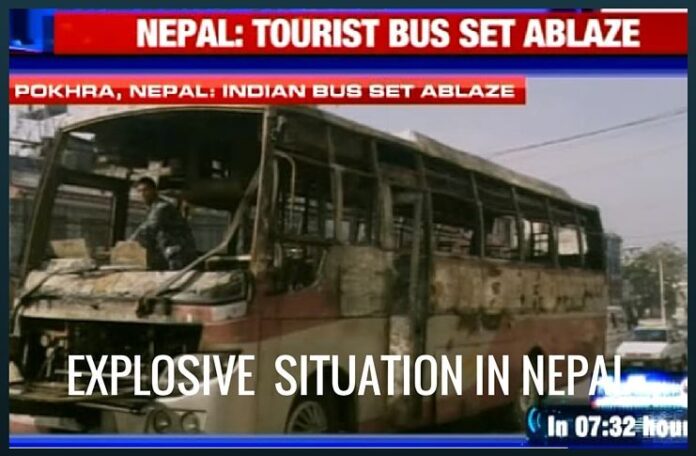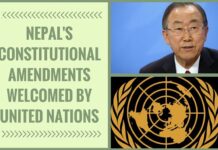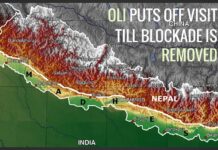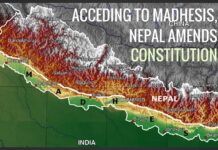
New Delhi, November 29
- November 30: An Indian tourist bus (UP 51 T 8311) parked at Dihikopatan of Lakeside in Pokhara was set on fire on Monday morning around 9AM.
- November 22: Nepal police gunned down four Madhesi protestors in an attempt to remove the blockade in Saptari district.
- November 20: Madhesi protestors agitating under the umbrella of Joint Democratic Madhesi Front (JDMF) torched an ambulance and a truck carrying medicines from India to Nepal.
- Nearly 2,000 Nepal-bound trucks are stranded on the Raxaul-Birgunj border since September 21, when the Nepal promulgated its controversial Constitution, triggering violent protests from the Madhesis against several of its discriminatory provisions.
[dropcap color=”#008040″ boxed=”yes” boxed_radius=”8px” class=”” id=””]A[/dropcap]s anti-India feelings swept across Nepal following protests by the Indian-origin Madhesis against discriminatory provision of the recently promulgated new Constitution, an Indian tourist bus was set on fire at the lakeside of the popular tourist spot of Pokhra, 200 km west of the capital Kathmandu on Monday. No one was hurt in the incident but the bus was completely gutted.
Reports said that the bus came from Gujarat with 49 tourists and bore an Indian registration number. It was parked by the lakeside when three miscreants sprinkled petrol on it and set it on fire around 1 PM on Monday. Kaski Police Chief SP Hari Bahadur Pal told the Nepali media that the interior of the bus, UP 51 T 8311, was reduced to ashes in the arson.
Interestingly, the police are not ready to believe the driver‘s version of the incident that three persons of Nepali origin set fire to the bus. Instead, they have come out with the bizarre theory that the bus driver himself set fire to the vehicle.
“Only the interior of the bus, including all the seats, was burnt. The fire hasn’t affected the outer parts and the tires much. If outsiders had set fire to the bus, everything would have been burnt, not just the interior of the bus,” SP Hari Bahadur Pal, chief of District Police Office (DPO), Kaski said, according to reports in the Nepal media. “We suspect that they set the bus on fire themselves. But the investigation is underway to establish the real cause,” he added.
[dropcap color=”#008040″ boxed=”yes” boxed_radius=”8px” class=”” id=””]T[/dropcap]he fire was doused with the combined efforts of police personnel, locals and firefighters. The bus had reached Pokhara from Kathmandu on Sunday carrying forty-nine people, including the bus driver, his assistant and tour guide. All the tourists are from the Indian State of Gujarat, according to SP Pal.
Meanwhile, officials involved with the tourism sector are shocked over the incident. In a press statement, Pokhara Tourism Board condemned the incident.
“All the tourists, irrespective of where they come from, should feel safe. They should be able to travel in the country safely without fear,” said Som Bahadur Thapa, chairman of the board.
The incident took place a week after the Madhesi protestors agitating under the umbrella of Joint Democratic Madhesi Front (JDMF) torched an ambulance and a truck carrying medicines from India on November 20.
[dropcap color=”#008040″ boxed=”yes” boxed_radius=”8px” class=”” id=””]N[/dropcap]epal is reeling under acute shortage of diesel and essential commodities because the Madhesis protestors have blocked movement of trucks from the Indian side. Prices of most consumer goods are escalating in Nepal and even life saving medicines are out of stock. This has caused a deep sense of resentment towards India in the Himalayan kingdom. The burning of the tourist bus is seen as manifestation of simmering anger.
Nepal is trying to blackmail India by giving the impression that it can meet its requirements of fuel, LPG and essential commodities from China. But New Delhi realizes that the hilly terrain between Nepal and China is not going to make such an exchange easy in the long run.
The Madhesis are Indian-origin inhabitants of Nepal’s Terai region. They are protesting against several provisions of the new constitution which seeks to divide their homeland of Terai region into seven parts and stipulates that the children of Nepal woman marrying Madhesis would not get the country’s citizenship. Madhesis form one third of Nepal’s population and occupy at least one fifth of the territory.
[dropcap color=”#008040″ boxed=”yes” boxed_radius=”8px” class=”” id=””]N[/dropcap]early 2,000 Nepal-bound trucks are stranded on the Raxaul-Birgunj border since September 21, when the Nepal promulgated its controversial Constitution, triggering violent protests from the Madhesis against several of its discriminatory provisions.
During the nine weeks, more than 50 Madhesis have been killed by the Nepal police even as India continued to mount pressure on Kathmandu to accommodate genuine concerns of the Madhesis and remove the contentious provisions of the Constitution.
On November 24, two days after the Nepal police gunned down four Madhesi protestors in an attempt to remove the blockade in Saptari district, Indian ambassador to Nepal Ranjit Rae once again called on Nepal to end the impasse by addressing the demands of the Madhesi community and help strengthen Nepal-India relations.
“The relations between Nepal and India are based on people-to-people ties and nothing can spoil that,” he said at the event organized by the Nepal-India Friendship Society.
[dropcap color=”#008040″ boxed=”yes” boxed_radius=”8px” class=”” id=””]H[/dropcap]owever, Nepal has made it clear it will not accept the “big brother” attitude of India. “We want to take forward relationship with India based on equality and same applies to China…We will not accept big brother attitude. Our opposition to India’s attitude does not mean we are inviting some other country to behave that way. Relations have to be equal (balanced) is what we feel,” Pradeep Gyawali, Secretary of Nepal’s ruling CPN(UML) told news agency PTI.
Gyawali also urged the Narendra Modi government to address the recent strain in the ties on a “priority basis”, asserting if India wants to play a role in world politics, it will have to first have cordial relations with its neighbours.
“So, we want Indian Government to review its position and address the problems which have surfaced (after Nepal adopted the new Constitution). We will expect India respects our sovereignty, right of Nepalese people to take care of its own problems,” he added.
If the impasse is not resolved soon, then the situation can go out of hand, and Nepal will be staring at a long period of violence and suffering.
- Supreme Court rejects plea to tally all VVPAT slips with EVM votes; says ‘no going back to paper ballot’ - April 26, 2024
- US report citing human rights violations is deeply biased: India - April 25, 2024
- Kotak Mahindra Bank shares tank 13%. Market Cap erodes by Rs.37,721 cr post-RBI action - April 25, 2024










